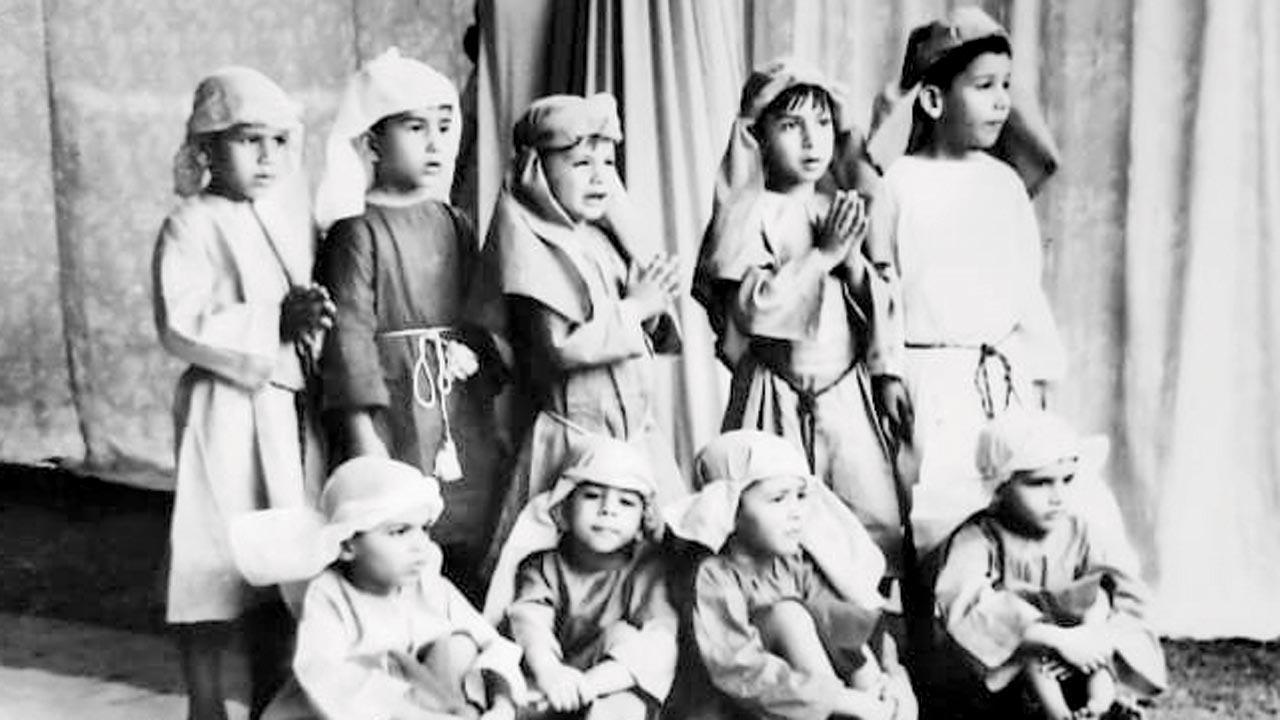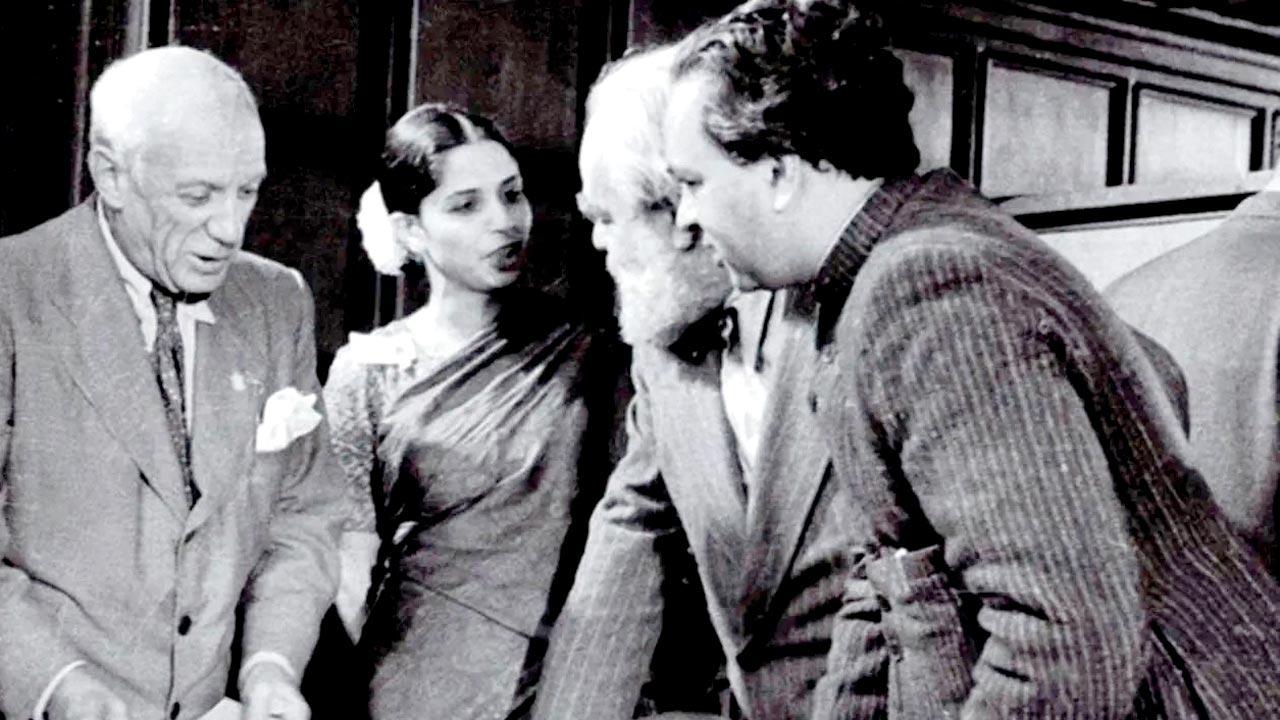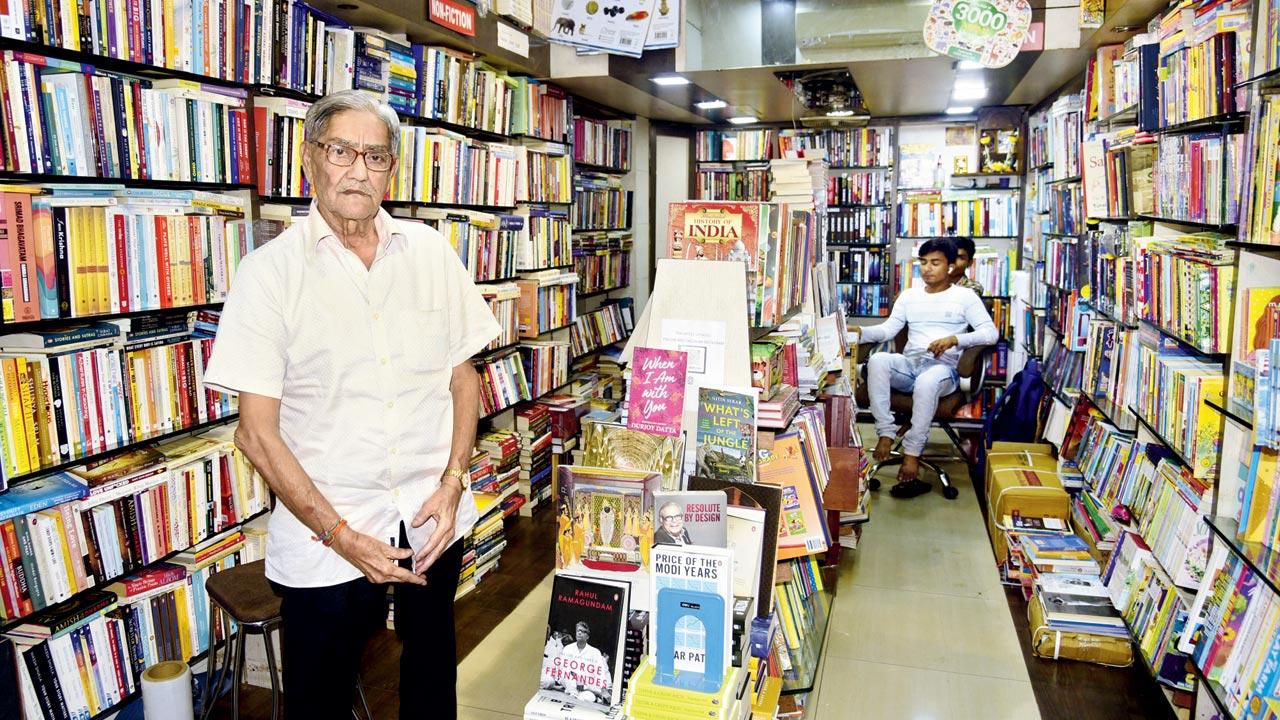Mapping three institutions of personal relevance, gracing Bombay since 1947—West Wind Nursery, Marg Publications and Happy Book Stall

Roshan Curmally with her West Wind class at Petit Hall
 To have a child who is an avid reader is a blessing. To have two reading kids is bonus bliss. The credit for mine turning out so goes largely to the late Roshan Curmally,
To have a child who is an avid reader is a blessing. To have two reading kids is bonus bliss. The credit for mine turning out so goes largely to the late Roshan Curmally,
charismatic principal of West Wind Nursery.
ADVERTISEMENT
They could have had no happier head-start to life and learning. The unique way she introduced three preschool generations to phonics and graphemes, groomed them to delight in the printed word. Not just stringing letters of the alphabet to create words, but to equally enjoy writing and counting.
Miss Curmally, Roshan Aunty to many, was 21 when she joined West Wind in December 1948 as its sole teacher. A post she was perfect for, thought five expatriate women forming the school a year prior. Eleanor Billimoria, Suzy Rutz, Trudi Mueller, Mrs Girsperger and Mrs Reynolds conceived this non-profit mothers’ cooperative.

A still from the school Nativity play of 1968
Sprouting small—from the home of Reynolds, an American trained kindergarten teacher who conducted classes three mornings a week—the experiment moved to Petit Hall on Nepean Sea Road. The Shantiniketan-like ambience with soft Arabian Sea breezes swaying trees over class on the grass, lent the school its name. West Wind shifted to Walkeshwar in 1968, Breach Candy from 1989 to 2008, and is located today in Gamdevi.
Like thousands of toddlers before them, mine bloomed in the 1990s with the focused attention each received through Playway techniques in an organically nurturing environment. Loyal to the nursery’s founding vision, Roshan Aunty coaxed parents to get involved in administration, sharing resources and talents. Working mums like us willingly carved time for responsibilities at portfolios including maintenance, library, archives and entertainment.
 Mulk Raj Anand (extreme right) and Minnette de Silva (centre), with Pablo Picasso (extreme left) and sculptor Jo Davidson, with issues of Marg magazine at the World Congress of Intellectuals in Defence of Peace in Wroclaw, Poland, 1948. Pic/Wikimedia Commons
Mulk Raj Anand (extreme right) and Minnette de Silva (centre), with Pablo Picasso (extreme left) and sculptor Jo Davidson, with issues of Marg magazine at the World Congress of Intellectuals in Defence of Peace in Wroclaw, Poland, 1948. Pic/Wikimedia Commons
The watershed year before leaving for the next, “big” school, was, to Roshan Aunty’s mind, “the crucial transition between not learning and learning”. As the best educators do, she remembered every single pupil and family. She knew my husband attended West Wind in the mid-1960s, which of his buddies played what part in lawn pantomimes and plenty more. That astounding retentive passion spanned decades—the late 1940s, when she began her long innings, to 2011 on retirement after forty years as principal before passing on the baton to her niece Khushie. Another amazing lady gracing the school was its music teacher of 49 years, Piloo Maneckji. She and PE instructor Pesi Padshah taught both my husband and kids.
A paradise for individualism, the nursery encourages the quietest to find their own shine sans fear of judgement. Asked the inevitable question, “What do you want to be when you grow up?” our then shy son calmly replied, “The man who will allow visitors to go up to the top of Rajabai Clock Tower.” Recovering from momentary surprise at his answer, we were thrilled by its originality. Around us had rung predictable responses of doctor, bus driver and engine guard.

Rajan Jerajani at Happy Book Stall, Bandra. Pic/Atul Kamble
Steadfastness to principles has set this nursery apart from glitzy money-making schools mushrooming by the month. Inclusiveness, for example. One grateful father says, “Miss Curmally was a brilliant educationist and humanist. My daughter with special needs benefited tremendously from the self-esteem the school instilled.”
Not one to be bulldozed into acting contrary to the school philosophy, she never buckled under “Do you know who we are” threats or demands from political and industrialist bigshots. Despite detractors (mainly those denied admission) associating the school with social snobbery, true to its non-profit ideology West Wind charges among the lowest preschool fees and raises substantial funds for NGOs dedicated to the primary education and health of underprivileged children.
The West Wind years overlapped with another non-profit institution, which always remains a favourite workplace. Through the 1990s, I worked as text editor for Marg Publications in Kala Ghoda’s stunning Army & Navy Building. This gem is contoured on Classical Revivalist lines by Gostling and Morris, specialists in this style in the later 19th century, which generally preferred Neo Gothic and Indo Saracenic design.
Seven ads and two rooms launched a magazine that trended the highest standards in art journals of global eminence. The space was granted by JRD Tata on meeting writer Mulk Raj Anand. Struck by the spectacular friezes of Ajanta on a visit, Anand gathered a group of Bombay activists and intellectuals as the freedom movement peaked to a crescendo. With justified pride they birthed Marg, the magazine riding tall on the idealism of a newly minted nation poised for exciting beginnings. Published from October 1946, the inaugural issue of Marg was wedged amid World War II and Indian independence, a critically loaded phase.
Clustered, the initials spelt Modern Architectural Research Group (MARG). Parallelly, the Sanskrit meaning of the word—path—also implies Marg shows the way to Indian civilization. Current editions wear a vastly different look from the original, but the visual content stays splendidly rich, with not the scantest compromise on archival value. Flexible and reinventive, the publication proactively keeps pace with critical thinking and a plurality of subscribers who redefine the meaning and future of culture. Scholarly yet contemporary, the magazine historicises, but demystifies.
Marg is where I got a pair of the greatest gifts. Beautiful colleagues who became the loveliest of friends and an understanding of the sheer depth and luminosity of the country’s stupendous heritage. As a result, I seldom stand before a temple without drawing deep breaths of awe at architectural intricacies all the way from soaring gopuram gatehouse to dvarapala door guards at eye level. Nor will I pick a saree without tracing the origins of its weave and, when possible, weaver. Or appreciate a painting without wondering about its provenance and artist’s background.
I jobbed here in the decade that transformed my family life forever. This was where I worked through my pregnancies until delivery day. It was special, it was visceral, the incredible feeling of walking into office to doubly warm greetings. The gentle support the Marg sisterhood extended, as I’d waddle in clutching a bellyful of baby, was accompanied by the welcome-young-life twitter of koels nesting at the window of our editorial den.
I recall once climbing the stairs down from the sloped roof attic, where the magazine’s design department sat, to take a much-awaited phone call. An ordered book had reached my favourite, Happy Book Stall in Bandra. Baby Watching by Desmond Morris. It was soon after I’d had my daughter. Done and dusted with titles like What to Expect When You’re Expecting, the second time round I was keen to figure how the zoologist author attempted explaining an infant’s view of the world.
“It seems only yesterday when you would come to browse in your convent uniform,” said proprietor Rajan Jerajani when I collected my coveted copy. I did dash to the Hill Road shop straight from school a couple of times in the month, wired with anticipation of arrivals added to the shelves. In a routine of reassuringly familiar gestures, Rajan would entice—“Ah, wait till you see this!”
My brother often announced trips to Tata Agiary, bang across the street from the bookshop. These plans particularly pleased our joint family elders, fervent and firm we could grow up bhannaar gannaar, suitably spiritual. Murmuring probably the fastest prayers recited within that fire temple, he and I ran opposite, redolently smelling of sandalwood, to bury noses between the fragrant pages of fresh-off-the-press paperbacks. Slave to the elder bro’s tastes, I devoured the William and Biggles series before succumbing to the Bobbsey Twins, Nancy Drew and, of course, Enid Blyton. Alistair Maclean, Nevil Shute and PG Wodehouse followed in gratifyingly quick succession. Without the plethora of children’s literature now so easily available, we still read like creatures possessed.
If 72-year-old Rajan Jerajani’s father Jamnadas opened the shop in 1947, his son Krutarth ably tends to it currently in tandem with his experienced father. “The store began because my family were vendors who got books and magazines from the dock and that led them to become booksellers,” Rajan says.
Their Colaba branch was rocked by spicy controversy in 1962. Held for stocking copies of Lady Chatterley’s Lover, Ranjit Udeshi who ran it, had to choose: a fine of R20 or a week in prison. The police planted a “test purchaser” who bought DH Lawrence’s contentious book, which was labelled obscene even 34 years after it shocked the public.
The secret to this little shop’s staying power? “People enquire about a loyalty card programme. We believe recommending good books is what should bring them back,” says Krutarth. “On a website everybody is offered the same discount, there’s no personal touch binding customer to bookseller.”
Rajan vividly remembers my mum and dad bringing me to the store, onward to me walking in alone… to the comforting continuity of seeing my daughter drive to the shop delivering boxes of my book, Once Upon a City. Yes, Happy has indeed been the first I sign up with, the moment I savour the feel of a raw colour dummy in my hands. And Rajan says, “This is real joy for me to see. It’s what is meant by coming full circle.”
Author-publisher Meher Marfatia writes fortnightly on everything that makes her love Mumbai and adore Bombay. You can reach her at [email protected]/www.meher marfatia.com
 Subscribe today by clicking the link and stay updated with the latest news!" Click here!
Subscribe today by clicking the link and stay updated with the latest news!" Click here!







